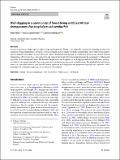Files in this item
Well-digging in a community of forest-living wild East African chimpanzees (Pan troglodytes schweinfurthii)
Item metadata
| dc.contributor.author | Peter, Hella | |
| dc.contributor.author | Zuberbühler, Klaus | |
| dc.contributor.author | Hobaiter, Cat | |
| dc.date.accessioned | 2022-06-14T09:41:14Z | |
| dc.date.available | 2022-06-14T09:41:14Z | |
| dc.date.issued | 2022-06-06 | |
| dc.identifier | 279803138 | |
| dc.identifier | 7a0c2b48-6288-4d01-8f58-14fbe9635483 | |
| dc.identifier | 85131545470 | |
| dc.identifier | 000806146600001 | |
| dc.identifier.citation | Peter , H , Zuberbühler , K & Hobaiter , C 2022 , ' Well-digging in a community of forest-living wild East African chimpanzees ( Pan troglodytes schweinfurthii ) ' , Primates , vol. First Online . https://doi.org/10.1007/s10329-022-00992-4 | en |
| dc.identifier.issn | 0032-8332 | |
| dc.identifier.other | ORCID: /0000-0001-8378-088X/work/114335702 | |
| dc.identifier.other | ORCID: /0000-0002-3893-0524/work/114335715 | |
| dc.identifier.uri | https://hdl.handle.net/10023/25524 | |
| dc.description | Funding was received for this research from the University of St Andrews and the Kirsten Scott Memorial Trust. The Budongo Conservation Field Station is supported by the Royal Zoological Society of Scotland. CH is supported by funding from the European Union’s 8th Framework Programme, Horizon 2020 (grant agreement no. 802719). | en |
| dc.description.abstract | Access to resources shapes species’ physiology and behaviour. Water is not typically considered a limiting resource for rainforest-living chimpanzees; however, several savannah and savannah-woodland communities show behavioural adaptations to limited water. Here, we provide a first report of habitual well-digging in a rainforest-living group of East African chimpanzees (Pan troglodytes schweinfurthii) and suggest that it may have been imported into the community’s behavioural repertoire by an immigrant female. We describe the presence and frequency of well-digging and related behaviour, and suggest that its subsequent spread in the group may have involved some degree of social learning. We highlight that subsurface water is a concealed resource, and that the limited spread of well-digging in the group may highlight the cognitive, rather than physical, challenges it presents in a rainforest environment. | |
| dc.format.extent | 10 | |
| dc.format.extent | 1468169 | |
| dc.language.iso | eng | |
| dc.relation.ispartof | Primates | en |
| dc.subject | Culture | en |
| dc.subject | Social transmission | en |
| dc.subject | Pan troglodytes | en |
| dc.subject | Water access | en |
| dc.subject | Hydration | en |
| dc.subject | QL Zoology | en |
| dc.subject | T-DAS | en |
| dc.subject.lcc | QL | en |
| dc.title | Well-digging in a community of forest-living wild East African chimpanzees (Pan troglodytes schweinfurthii) | en |
| dc.type | Journal article | en |
| dc.contributor.sponsor | European Research Council | en |
| dc.contributor.institution | University of St Andrews. Institute of Behavioural and Neural Sciences | en |
| dc.contributor.institution | University of St Andrews. Centre for Social Learning & Cognitive Evolution | en |
| dc.contributor.institution | University of St Andrews. School of Psychology and Neuroscience | en |
| dc.identifier.doi | 10.1007/s10329-022-00992-4 | |
| dc.description.status | Peer reviewed | en |
| dc.identifier.grantnumber | 802719 | en |
This item appears in the following Collection(s)
Items in the St Andrews Research Repository are protected by copyright, with all rights reserved, unless otherwise indicated.

